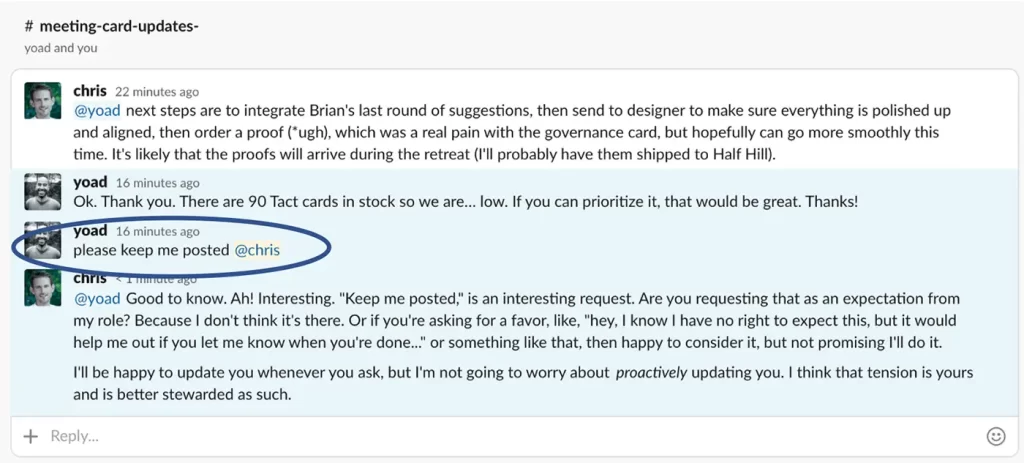Understanding Holacracy Projections (Part 3): Phrases to Watch Out For
Holacracy Practitioner’s Guide
Holacracy Practitioner’s Guide

In the conventional paradigm, when you ask someone for a projection on something they’re working on, it can easily be interpreted as a challenge to their competence. Remember, there is often an unconscious assumption that a request for transparency is somehow incompatible with trust (see #7, Projections allow us to redefine what it means to trust someone). So, expect to encounter something like this…
You’re an experienced Holacracy practitioner and someone agrees to take a project to update the website with new information you provided. You ask them for a projection on when they think they’ll do it, and they respond, “Oh, I got it. I’m working on it. It’s no problem at all…trust me.” How would you respond? Well, you could try something like this:
“Oh, I think there is a misunderstanding here. I’m asking for a Holacracy-style projection, which is just a rough estimate of when you expect you’ll likely get the website updated. So, I don’t need your commitment to this. In fact, you can trust me that I take responsibility for following up with you as often as I need. I just need your best estimate given all the current information you have…”
Now, obviously, that’s a lot to say. I phrased it this way to include all of the important emphasis and nuance. You’ll have your own way of making it clear that you weren’t challenging their competence by asking for a projection (e.g. “Oh, I do trust you. This is not about you. It’s about getting some data so my role can move forward).
True story. When I was getting married it was my job to plan the rehearsal dinner. My parents graciously offered to pay for it, but since they lived far away, it was my job (i.e. role) to handle the logistics. It’s probably a situation most people are familiar with. After several months of slow progress, my mom asked for an update. I explained what had happened and my intentions going forward. I probably sounded a little deflated too because, well, logistics aren’t really my thing. Then it happened.
“Well, I know you’re doing your best,” she said. “I don’t want to keep bothering you about it.”
Normally, I wouldn’t think much of this statement. It makes perfect sense given the conventional way we handle outcome-commitments inside of relationships. I might have even appreciated her confidence in me. But thankfully, I’ve benefitted from the distinctions inherent to how Holacracy handles projections, so I was able to respond in a new way by saying:
“Oh, thanks. But…um, don’t. Don’t just trust me. I don’t want you to sit back worrying about something and then not call me about it. I need to be able to trust that if you have questions or concerns, you’ll raise them with me and we can figure it out. Otherwise, I’ll have to constantly worry that you think something is wrong, but you aren’t telling me. So, you won’t ever be bothering me by asking for an update.”
This example shows that while Holacracy’s rule about projections is quite technical, and only intended to be relevant when working with others playing by the same rule, it can still be applied in non-Holacracy spaces. You just need to take the time to translate.
I come across this phrase fairly often, so it’s an important one to deconstruct. “Keep me posted,” or “Just let me know when you…” is requesting some sort of proactive follow-up. And that is perfectly fine if your role is accountable for it, or if your role is impacted.
However, it could be that your role doesn’t feel tension about the issue and the other person has unconsciously assumed it does. This is the case of someone trying to get you to “raise their child for them” (i.e. trying to get you to process their tension for them). (See #6 in Understanding Projections Part 1 if you haven’t already.)
Even though this happens unconsciously and innocently, it’s important to intervene and clarify so you don’t increase the likelihood that the other person comes away thinking you’ve made a commitment you didn’t make.
Here is a real exchange I had with my business partner Yoad not long after he joined HolacracyOne:

My response was long and I remember feeling awkward writing it, but it was good practice for me. And Yoad later said that it helped him too. And remember, if Yoad wanted the right to expect me to proactively and regularly keep him posted, no problem. He would just bring a proposal to a governance meeting to add it as an official expectation to my role (I wouldn’t have even objected to it).
These three phrases are just examples. Obviously different cultures and languages have their own unique colloquialisms. The point is that our assumptions about each other are embedded in our language. It’s often important to get ahead of these things before they unnecessarily blow up into hurt feelings of violated trust, even if it may require some nuanced communication at first.
Holacracy Basics: Understanding Deadlines and Projections (Part 1)
Holacracy Basics: Understanding Deadlines and Projections (Part 2)
Join me on the Holacracy Community of Practice.
Read “Introducing the Holacracy Practitioner’s Guide” to find more articles.
To learn more about self-management, join a community of pioneers and check out our e-courses → Self-Management Accelerator
